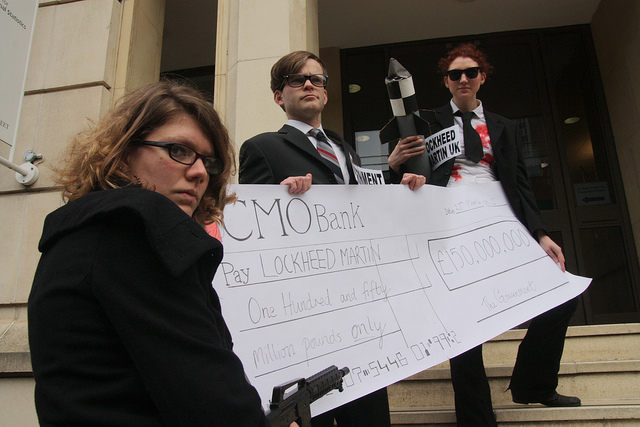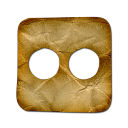An arms industry giant
Lockheed Martin is the world’s largest arms company, having overtaken BAE Systems in 2009.
In 2008 its military sales amounted to $29.9 billion (£18.4 billion) out of a total sales of $42.7 billion (£26.2 billion). This translates as military sales representing 70 percent of the total -a figure that has risen to 74 percent in 2009.
Lockheed produce, among other things, the C130J Hercules Transport and F-16 fighter jets that have been used by Israel e.g. to murder civilians in Gaza during Operation Cast Lead, F-35 Joint Strike Fighters, Hellfire Missiles, and cluster munitions. The company developed and manufactured the UK’s Trident nuclear missiles, are one of three three private companies to run the Aldermaston nuclear base in the UK, and have a £5.3bn contract with the UK government to design and build new weapons of mass destruction.
Lockheed Martin also jointly developed missile and radar systems for the Aegis destroyers that the US is pressuring South Korea to allow to dock on Jeju Island. As part of Obama’s “Forward Base” defence strategy, the US wants to surround China with ‘defence’ missile systems that also have offensive capabilites. South Korea is progressing, despite protests by locals and the untold damage the base will do both to global security, local democracy, and the UNESCO world heritage site the island is it. The campaign against the base has drawn high-profile backers, such as Gloria Steinem and Robert Redford.
Lockheed and the 2011 census
The contract for data collection and storage is often contracted out to private companies. In 2008, Lockheed won the £150m contract to deliver data capture and processing capability for the census on behalf of the Office for National Statistics (ONS), over 80 other competitors.
Lockheed also won a contract for the 2006 Canadian census, and the 2001 UK census.
The Patriot Act
Lockheed Martin –which does 80 percent of its work for the US defence department– assists more than two dozen American government agencies and is involved in surveillance and data processing for the CIA and FBI.
It has controversially provided private contract interrogators to the Abu Ghraib prison in Iraq and Guantánamo Bay in Cuba. All US-based companies are subject to the Patriot Act, which allows the US government to have access to any data in the company’s possession. Campaigners have warned this could give the US government access to detailed and personal data on the UK’s entire population.
Lockheed Martin is trying hard to get into the intelligence market, mixing their data gathering and processing arm with intense UK lobbying to relax data protection laws.
Brief History
Lockheed Martin was formed in March 1995 with the merger of Lockheed Corporation and Martin Marietta Corporation. Lockheed Martin UK, the subsidiary responsible for the data management systems involved in conducting the census, works across the military, technology and civil sectors. Lockheed Martin UK employs around 1,700 people at a dozen sites across the UK.
Lockheed in the 2003 Iraq War
Lockheed’s F-117 stealth attack fighters were used at the beginning of the US invasion of Iraq, while its former vice-president, Bruce Jackson, chaired the Coalition for the Liberation of Iraq, a bipartisan group formed to promote George W. Bush’s plan for war in Iraq. Jackson was also involved in corralling support for the war from Eastern European countries, going so far as helping to write their letter of endorsement for military intervention.
Lockheed Martin started moving into the intelligence market after 9/11, and 2005 saw them emerge as one of the largest employers of private military interrogators. Those stationed in Iraqi prisons received a $2,000 bonus just for signing up, with further benefits down the line. The prisons included Abu Ghraib, Camp Cropper, a prison at Baghdad International Airport, and Camp Whitehorse, near Nasariyah. Lockheed Martin first got involved in the interogation contracting business immediately after September 11 2001. Lockheed Martin’s involvement in military interogations is through the company Sytex which it bought for $462 million.
After the Abu Ghraib scandal the Pentagon began awarding ‘no-bid’ contracts to Lockheed.
Lockheed’s Keyhole and Lacrosse satellites beam images from the war back to the military; its U-2 and the SR-71 Blackbird spy planes, F-16, F/A-22 jet fighters, and F-117 stealth attack fighters were used to “shock and awe” the Iraqis at the start of the US invasion; and ground troops employed its Hellfire air-to-ground missiles and the Javelin portable missiles in the invasion of Fallujah.
All Iraq war sources can be found here.




